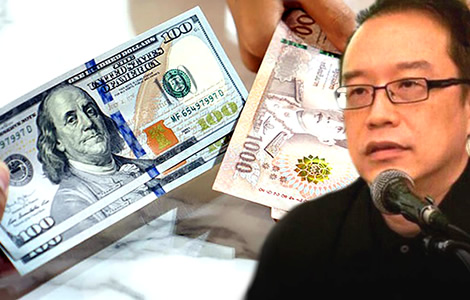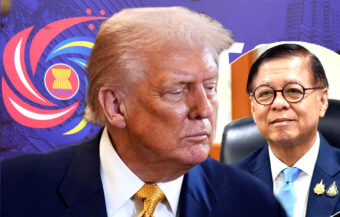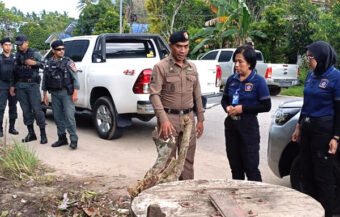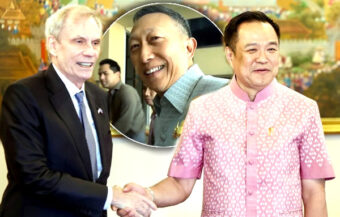Top economist warns Thailand’s fragile economy faces severe pressure as a stronger baht, fueled by capital inflows, US economic weakness, and 19% tariffs, threatens exports, tourism, domestic growth, and raises production costs for businesses this year.
Thailand’s top economist, Dr. Anusorn Thamjai of the University of the Thai Chamber of Commerce (UTCC), is sounding the alarm. He warns the interim government that a stronger baht could hit an already fragile economy hard this year. Ironically, the baht’s surge is fueled by the kingdom’s own strong external reserves and solid financial position. Yet, despite this strength, the currency may breach the ฿30-per-dollar mark before year’s end, putting exports, foreign tourism and the broader economy under serious pressure.

Thailand’s economy is facing mounting pressures as a weakening of economic conditions in the United States compounds domestic challenges. Furthermore, the United States, Thailand’s largest export market, recently imposed a 19% reciprocal tariff on Thai goods. Consequently, Thai exports to the U.S. are expected to fall sharply for the remainder of the year. In addition, domestic manufacturing output may also decline as global demand softens.
Recent data from the U.S. Federal Reserve shows that America’s economy is cooling. Hiring growth has slowed, while summer economic sentiment has weakened considerably. Therefore, expectations for further U.S. interest rate cuts have intensified.
As a result, a flight of capital from American markets is underway. Significantly, some of this capital is flowing into Thailand, drawn by financial stability and relatively high returns.
Capital inflows provide limited relief as Thailand faces tariffs and weakening manufacturing output
Despite these capital inflows, Thailand’s economy remains fragile. Fiscal borrowing requirements continue to rise, placing further pressure on government finances. Nevertheless, Thailand possesses robust external financial reserves, providing some resilience against shocks.
Moreover, nearly all Thai public debt—99%—is held domestically. This limits reliance on foreign investors and reduces the risk of sudden capital flight destabilising the bond market.
However, the strengthening Thai baht has created additional challenges. The currency’s appreciation has increased export costs, eroding Thailand’s competitiveness abroad. In addition, the rising baht threatens the tourism sector. Tourist arrivals are already down more than 7% this year. Therefore, foreign visitor spending could decline further, creating a drag on economic growth. Experts warn that if the baht continues to strengthen, the tourism sector could face prolonged weakness.
Thailand’s exports are also affected by U.S. tariffs. Importers in the United States are increasingly seeking cheaper alternatives, while other key markets are also affected by the stronger baht. Consequently, export revenue is under severe pressure. Furthermore, the combined impact of tariffs and currency appreciation may lead to slower economic growth, lower profits for exporters, and weakened domestic demand.
Rising baht and U.S. tariffs severely impact exports and tourism, putting pressure on Thailand’s economy
On Sunday, September 14, 2025, Associate Professor Dr. Anusorn Thamjai, Dean of the Faculty of Economics at the University of the Thai Chamber of Commerce, warned about the rapid baht appreciation. He explained that exports and tourism are the most vulnerable sectors. If current trends continue, the fourth quarter may see negative export growth. Furthermore, deflationary pressures could increase if the government fails to act promptly.
Dr. Anusorn highlighted that the government must accelerate spending while increasing the money supply and lowering interest rates. These steps would stimulate economic activity and help slow the baht’s rapid appreciation.
Moreover, he clarified that gold exports are not the primary driver of the baht’s gains. Policies requiring gold trades in baht, while subject to specific taxes, would likely have minimal impact. Instead, expanding baht liquidity in the financial system would be more effective.
The baht’s strength is driven by multiple factors, including trade and current account surpluses. In addition, short-term speculative capital inflows into financial markets are exacerbating appreciation.
Government urged to increase spending and liquidity to stabilise exports and tourism amid rapid appreciation
The weakening U.S. dollar has further accelerated this trend, reflecting softer U.S. economic data. Consequently, expectations of U.S. Federal Reserve interest rate cuts are encouraging investors to shift funds away from dollar-denominated assets.
If the Federal Reserve cuts interest rates by 0.50% at its September 16-17 meeting, the baht could further strengthen. Analysts suggest it could test the 30.50–31.00 baht per dollar level. Moreover, this could intensify challenges for exporters who face declining competitiveness and rising production costs.
Certainly, there is good reason to suspect that the baht may break through the ฿30 per dollar rate toward the end of 2025. The dollar has fallen 7% in value compared to the baht since the start of the year and 4.49% in the last 12 months.
While the U.S. slowdown is concerning, it does not resemble a subprime crisis or immediate recession. Instead, trade protectionism and restrictive immigration policies are creating long-term structural challenges.
High tariffs force domestic production of goods that are cheaper to import. As a result, production costs rise and consumer living standards decline. Similarly, immigration restrictions create labour shortages in agriculture and construction. Consequently, U.S. productivity may be hampered in the medium term.
Weak U.S. economic performance and policies continue to push capital into Thailand, boosting the baht
During the 2008-2009 subprime financial crisis, the Federal Reserve cut interest rates ten times and implemented multiple emergency measures. These included easing liquidity requirements, providing short-term loans, conducting central bank swaps, and purchasing troubled assets.
However, Dr. Anusorn notes that the current U.S. situation is far less severe. A modest policy rate reduction from 4.5% to 3% by mid-2026 should suffice to support economic growth.
The United States’ high public debt, currently $36.2 trillion or 122% of GDP, further pressures the dollar. Periodic increases to the debt ceiling are required, while investors gradually reduce holdings of U.S. government bonds. Consequently, the dollar remains weak in the long term. This weakness has amplified the baht’s appreciation, creating additional challenges for Thai policymakers.
Dr. Anusorn stressed that Thailand’s flexible exchange rate system allows the baht to adjust naturally under normal conditions.
Thailand’s robust financial reserves provide stability, but a rapid baht rise threatens exports and foreign tourism
Central bank intervention using international reserves is generally unnecessary. However, the rapid currency appreciation may exceed what exporters can adapt to. Many businesses are not equipped with hedging tools, leaving them exposed to sudden fluctuations. Therefore, management measures to slow appreciation are necessary to protect exporters and maintain competitiveness.
Strategic government spending is also critical, according to Dr. Anusorn. Thailand’s public debt currently stands at 67.9% of GDP and is projected to reach 68.9% within three years. Average budget deficits are rising compared to ASEAN peers. At the same time, tax receipts are falling, with the government likely not to reach its revenue target in this financial year.
Consequently, fiscal prudence is necessary. The interim government must avoid policies that increase public debt without addressing structural economic issues. Spending cuts should target inefficiencies and focus on effectiveness.
Revenue-raising strategies are essential to mitigating budget deficits. A credit rating downgrade could result from fiscal mismanagement.
Interim government urged to pursue fiscal prudence and revenue measures to prevent credit rating downgrade
If this occurs, borrowing costs for both public and private sectors will increase sharply. Therefore, policymakers must adopt a clear, structured plan to manage the fiscal deficit and limit public debt growth.
Coordinated policy measures are crucial to navigating these challenges. Monetary easing, such as interest rate reductions, will stimulate domestic demand and slow currency appreciation. Indeed, the outgoing Pheu Thai-led government was reportedly planning a quantitative easing programme, which would have, in effect, devalued the baht.
However, that policy may not find favour with the more conservative Bhumjaithai Party-led interim government. The new government is expected to pursue a more hawkish course.
Fiscal measures, including targeted government spending, must support infrastructure, social programs, and export competitiveness. Additionally, structural reforms are needed to enhance business efficiency and improve export promotion mechanisms.
Monetary easing and strategic spending are essential to stabilise economy with a hawkish interim government
The tourism sector faces particular risks from the stronger baht. Rising costs for accommodation, services, and attractions may certainly deter foreign visitors. Declining tourist arrivals and reduced spending, in turn, will slow economic growth.
Experts recommend targeted marketing campaigns, visitor incentives, and other measures to preserve tourism revenues. These steps are necessary to offset losses caused by currency strength.
Thai exporters must also adapt to a challenging global environment. Rising production costs, higher currency values, and U.S. tariffs require careful planning. Businesses need to diversify export destinations, adjust pricing strategies, and utilise hedging tools to manage exchange rate volatility. Without such measures, revenue declines and reduced profitability are on the cards.
Tourism and exports must adapt quickly as a stronger baht and tariffs threaten Thailand’s growth projections
Overall, Thailand’s economic outlook is complex. A combination of currency appreciation, trade pressures, and domestic fiscal constraints creates risks and a downside. Policymakers must act decisively to maintain export competitiveness, stimulate domestic demand, and preserve fiscal stability.
Rate cut anticipated as outgoing Bank of Thailand governor attends last Monetary Policy Committee
Game changer US Thai trade deal approved at special cabinet meeting as 19% tariff rate warmly welcomed
Certainly, Thailand finds itself challenged economically again. Rapid baht appreciation, global market pressures, and fiscal constraints require strategic, well-coordinated policies. Export competitiveness, tourism revenues, and public debt management will determine the kingdom’s economic path.
Monetary easing, strategic government spending, and structural reforms are necessary to stabilise the economy and prevent long-term vulnerabilities. The coming months will test Thailand’s resilience as it faces currency fluctuations, global uncertainties, and ongoing domestic economic pressures, including a political and constitutional crisis.
Join the Thai News forum, follow Thai Examiner on Facebook here
Receive all our stories as they come out on Telegram here
Follow Thai Examiner here
Further reading:
Rate cut anticipated as outgoing Bank of Thailand governor attends last Monetary Policy Committee
Last minute tweaks in Bangkok as deal is finalised with U.S. However, Thailand may not match Vietnam


















